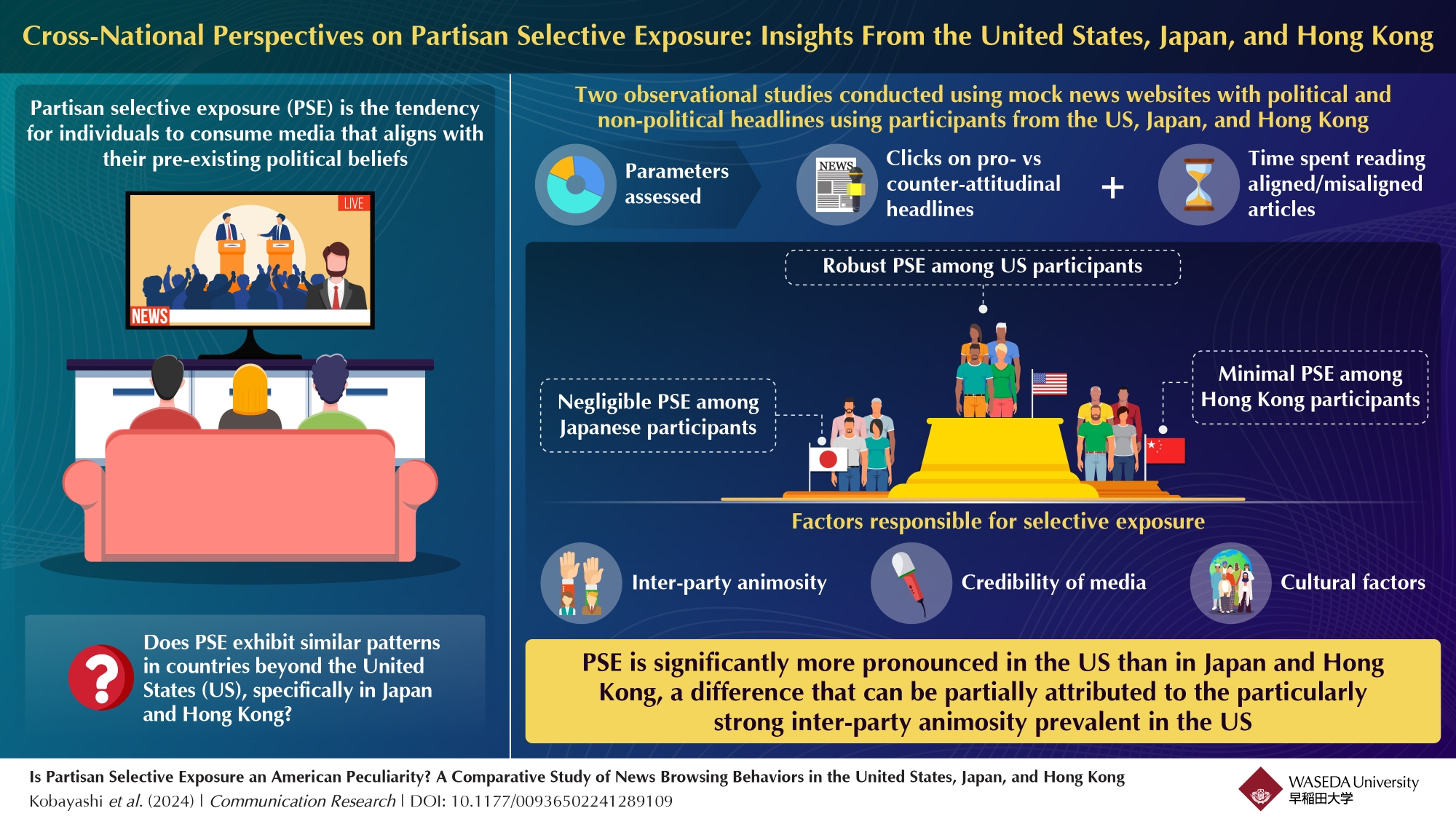Understanding Causes of Echo Chambers: Political News Selective Exposure Across Countries
Mon, Nov 11, 2024-
Tags
Understanding Causes of Echo Chambers: Political News Selective Exposure Across Countries
New study explores how news consumption preferences are influenced by culture, political polarization, and the credibility of news outlets
A new cross-national study from Japan reveals significant differences in partisan selective exposure to news content among the United States (US), Japan, and Hong Kong, challenging the universality of this behavior across cultures. While selective exposure is a well-documented phenomenon in the US, this study shows that it is much weaker or nearly absent in Japan and Hong Kong, raising critical questions about how political environments shape media consumption habits.

In our digital age, with easy access to a vast array of information, one would think that readers would naturally be exposed to a wide range of perspectives. However, the opposite seems to be happening, especially in countries like the United States (US), where people often seek out news that reinforces their existing beliefs and avoid content that challenges them. This tendency, known as partisan selective exposure, has been linked to increasing divides and tensions between different ideological groups. But is this behavior unique to the US, or is it a universal phenomenon driven by common psychological tendencies?
To answer this, a cross-national study was conducted led by Professor Tetsuro Kobayashi from the School of Political Science and Economics at Waseda University accompanied by Ling Liu from Waseda University, and Zhifan Zhang from Pennsylvania State University. This study examined how news consumption differs among individuals in the US, Japan, and Hong Kong. Their work was published online on October 10, 2024, in Communication Research.
Sharing their motivation for the study, Kobayashi explains, “Since political communication research is predominantly US-centric, there is a tendency to apply American findings directly to the Asian context. Our study challenges such a tendency and demonstrates the importance of conducting research that is specifically tailored to the Asian context.”
The researchers created mock news websites that presented participants with political and non-political headlines, giving them the option to select stories that either matched or contradicted with their political beliefs. They also analyzed the time spent on reading those articles.
The findings revealed that while Americans were more likely to choose news supporting their views, this behavior was less pronounced in Japan and Hong Kong.
“In the US, this selective exposure is fueled by several factors,” explains Kobayashi. “The country has a highly polarized and emotionally divided political environment, and many news outlets have clear political leanings.”
Over time, informational “echo chambers” facilitated by selective exposure can intensify political differences, fueling division and making it more difficult for people with opposing views to have meaningful conversations.
In contrast, Japan’s political climate is less polarized, and its news outlets are generally less partisan. Because these “echo chamber” tendencies are weaker, opposing groups may benefit from a more balanced flow of information, fostering a political climate that is less divided. Hong Kong presents a more complex case due to its unique political and media environment, but selective exposure there is still weaker than in the US.
“Our research challenges the assumption that selective exposure is just a natural human tendency driven by psychology,” adds Kobayashi. “Beyond the desire to avoid cognitive dissonance, our results suggest that the media and political environment of a country play a critical role in shaping how individuals engage with news.”
This raises important questions about how to design online and offline environments to encourage people to engage with a wider range of viewpoints, which could help reduce political polarization. Understanding why this behavior is more common in some countries than others can help guide efforts to improve the way people consume news. We hope this study paves the way for more advanced research tailored to Japan.
Reference
Title of Original Paper: Is Partisan Selective Exposure an American Peculiarity? A Comparative Study of News Browsing Behaviors in the United States, Japan, and Hong Kong
DOI: 10.1177/00936502241289109
Journal: Communication Research
Article Publication Date: October 10, 2024
Authors: Tetsuro Kobayashi1, Zhifan Zhang2, and Ling Liu3
Affiliations:
1Faculty of Political Science and Economics, Waseda University
2Pennsylvania State University
3Institute for Advanced Study, Waseda University
About Professor Tetsuro Kobayashi
Dr. Tetsuro Kobayashi is a Professor of Political Science at Waseda University, Japan. His research focuses on political communication, political psychology, and public opinion. He earned his Ph.D. in social psychology from the University of Tokyo in 2009. Before joining Waseda University, he held positions at the National Institute of Informatics and City University of Hong Kong.














